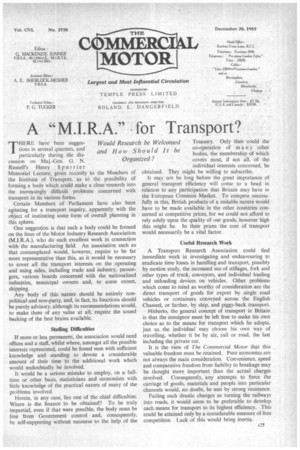A "M.I.R.A." for Transport?
Page 27

If you've noticed an error in this article please click here to report it so we can fix it.
THERE have been suggestions in several quarters, and particularly during the discussion on Maj.-Gen. G. N. Russell's Henry Spurrier Memorial Lecture, given recently to the Members of the Institute of Transport, as to the possibility of forming a body which could make a close research into the increasingly difficult problems concerned with transport in its various forms.
Certain Members of Parliament have also been agitating for a transport inquiry, apparently with the object of instituting some form of overall planning in this sphere.
One suggestion is that such a body could be formed on the lines of the Motor Industry Research Association (M.I.R.A.), who do such excellent work in connection with the manufacturing field. An association such as that contemplated would, however, require to be far more representative than this, as it would be necessary to cover all the transport interests on the operating and using sides, including trade and industry, passengers, various boards concerned with the nationalized industries, municipal owners and, to some extent, shipping.
Any body of this nature should be entirely nonpolitical and non-party, and, in fact, its functions should be purely advisory, although its recommendations would, to make them of any value at all, require the sound backing of the best brains available.
Staffing Difficulties If more or less permanent, the association would need offices and a staff, whilst where, amongst all the possible interests represented, could be found men with sufficient knowledge and standing to devote a considerable amount of their time to the additional work which would undoubtedly be involved.
it would be a serious mistake to employ, on a fulltime or other basis, statisticians and economists with little knowledge of the practical nature of many of the problems involved.
Herein, in any case, lies one of the chief difficulties. Where is the finance to be obtained? To be truly impartial, even if that were possible, the body must be free from Government control and, consequently, be self-supporting without recourse to the help of the Treasury. Only then could the co-operation of many other bodies, the membership of which covers most, if not all, of the individual interests concerned, be obtained. They might be willing to subscribe.
It may not be long before the great importance of general transport efficiency will come to a head in relation to any participation that Britain may have in the European Common Market. To compete successfully in this, British products of a suitable nature would have to be made available in the other countries concerned at competitive prices, for we could not afford to rely solely upon the quality of our goods, however high this might be. In their prices the cost of transport would necessarily be a vital factor.
Useful Research Work A Transport Research Association could find immediate work in investigating and endeavouring to eradicate time losses in handling and transport, possibly by motion study, the increased use of stillages, fork and other types of truck, conveyors, and individual loading and unloading devices on vehicles. Other problems which come to mind as worthy of consideration are the direct transport of goods for export by single road vehicles or containers conveyed across the English Channel, or farther, by ship, and piggy-back transport.
Hitherto, the general concept of transport in Britain is that the consignor must be left free to make his own choice as to the means for transport which he adopts, just as the individual may choose his own way of travelling, whether it be by air, rail or road, the last including the private car.
It is the view of The Commercial Motor that this valuable freedom must be retained. Pure economics are not always the main consideration. Convenience, speed and comparative freedom from liability to breakage may be thought more important than the actual charges involved. Consequently, any attempts to force the carriage of goods, materials and people into particular channels would, no doubt, be met by strong resistance.
Failing such drastic changes as turning the railways into roads, it would seem to be preferable to develop each means for transport to its highest efficiency. This could be attained only by a considerable measure of free competition. Lack of this would bring inertia.




























































































